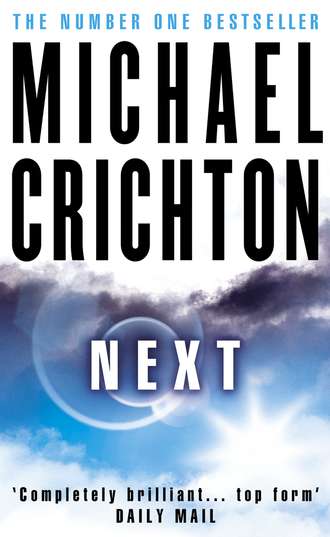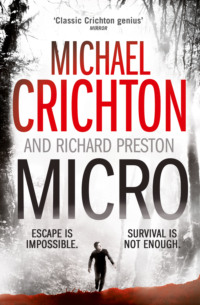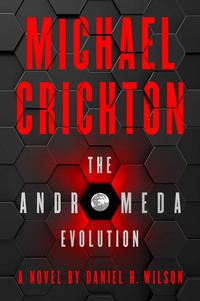
Полная версия
Next
“We do?”
“Sure. We keep a lot of tissue these days, Kevin. I mean, everybody that comes into the hospital, we collect as much as we possibly can legally…”
“That’s the wrong answer,” McCormick said, glowering.
“Okay. What’s the right answer?”
“That we don’t have any tissues from this guy.”
“But they’ll know that we do. At the very least, we did a tox screen on the guy because of the accident, so we have his blood—”
“That sample was lost.”
“Okay. It was lost. But what good does that do? They can always dig up the body and get all the tissues they want.”
“Correct.”
“So?”
“So let them do that. That’s Legal’s advice. Exhumation takes time, permits, and money. We’re guessing they won’t have the time or the money—and this thing will go away.”
“Okay,” Marty said. “And I am here because?”
“Because I need you to go back to pathology and confirm for me that, unfortunately, we have no more samples from the deceased, and that everything not given to the daughter has been lost or misplaced.”
“Got it.”
“Call me within the hour,” McCormick said, and turned away.
Marty Roberts entered the basement pathology lab. His diener, Raza Rashad, a handsome, dark-eyed man of twenty-seven, was scrubbing the stainless steel tables for the next post. If truth be told, Raza really ran the path lab. Marty felt himself burdened by a heavy administrative load, managing the senior pathologists, the residents, the medical student rotations, and all the rest. He’d come to rely on Raza, who was highly intelligent and ambitious.
“Hey, Raza. You remember that forty-six-year-old white guy with crush injuries, a week back? Drove himself into an overpass?”
“Yeah. I remember. Heller, or Weller.”
“The daughter asked for blood?”
“Yeah. We gave her blood.”
“Well, she ran a paternity test, and it came back negative. Guy was not her father.”
Raza stared blankly. “That right?”
“Yeah. Now the mother’s all upset. Wants more tissues. What’ve we got?”
“I’d have to check. Probably the usual. All major organs.”
Marty said, “Any chance that material got misplaced? So we couldn’t find it?”
Raza nodded slowly, staring at Marty. “Maybe so. Always possible it could be mislabeled. Then it would be hard to find.”
“Might take months?”
“Or years. Maybe never.”
“That’d be a shame,” Marty said. “Now, what about the blood from the tox screen?”
Raza frowned. “Lab keeps that. We wouldn’t have access to their storage facility.”
“So they still have that blood sample?”
“Yeah. They do.”
“And we have no access?”
Raza smiled. “It might take me a couple of days.”
“Okay. Do it.”
Marty Roberts went to the phone and dialed the administrator’s office. When McCormick came on the line, he said, “I have some bad news, Kevin. Unfortunately, all the tissues have been lost or misplaced.”
“Sorry to hear that,” McCormick said, and hung up.
“Marty,” Raza said, coming into the office, “is there a problem with this Weller guy?”
“No,” Marty said. “Not anymore. And I told you before—don’t call me Marty. My name is Dr. Roberts.”
CH010
At the Radial Genomics lab in La Jolla, Charlie Huggins twisted his flat-panel screen around to show Henry Kendall the headline: TALKING APE CLAIMED FRAUD. “What’d I tell you?” Charlie said. “A week later, and we learn the story’s a fake.”
“Okay, okay. I was wrong,” Henry said. “I admit it, I was worried about nothing.”
“Very worried…”
“It’s in the past. Can we talk about something important?”
“What’s that?”
“The novelty-seeking gene. Our grant application was denied.” He began typing at the keyboard. “Once again, we’ve been screwed—by your personal favorite, the Pope of Dopamine, Dr. Robert A. Bellarmino of the NIH.”
For the last ten years, brain studies had increasingly focused on a neurochemical called dopamine. Levels of dopamine seemed to be important in maintaining health as well as in diseases such as Parkinsonism and schizophrenia. From work in Charlie Huggins’s lab, it appeared that dopamine receptors in the brain were controlled by the gene D4DR, among others. Charlie’s lab stood at the forefront of this research, until a rival scientist named Robert Bellarmino from the National Institutes of Health began referring to D4DR as the “novelty gene,” the gene that supposedly controlled the urge to take risks, seek new sex partners, or engage in thrill-seeking behavior.
As Bellarmino explained it, the fact that dopamine levels were higher in men than women was the reason for the greater recklessness of men, and their attraction to everything from mountain climbing to infidelity.
Bellarmino was an evangelical Christian and a leading researcher at the NIH. Politically skilled, he was the very model of an up-to-date scientist, neatly blending a modest scientific talent with true media savvy. His laboratory was the first to hire its own publicity firm, and as a result, his ideas invariably got plenty of press coverage. (Which in turn attracted the brightest and most ambitious postdocs, who did brilliant work for him, thus adding to his prestige.)
In the case of D4DR, Bellarmino was able to tailor his comments to the beliefs of his audience, either speaking enthusiastically about the new gene to progressive groups, or disparaging it to conservatives. He was colorful, future-oriented, and uninhibited in his predictions. He went so far as to suggest that there might one day be a vaccine to prevent infidelity.
The absurdity of such comments so annoyed Charlie and Henry that six months before, they had applied for a grant to test the prevalence of the “novelty gene.”
Their proposal was simplicity itself. They would send research teams to amusement parks to draw blood samples from individuals who rode roller coasters time and again during the day. In theory these “repeat coasters” would be more likely to carry the gene.
The only problem with applying to the NSF was that their proposal would be read by anonymous reviewers. And one of the reviewers was likely to be Robert Bellarmino. And Bellarmino had a reputation for what was politely termed “appropriation.”
“Anyway,” Henry said, “the NSF turned us down. The reviewers didn’t think our idea was worthy. One said it was too ‘jokey.’”
“Uh-huh,” Charlie said. “What does this have to do with Robbin’ Rob?”
“Remember where we proposed to conduct our study?”
“Of course,” Charlie said. “At two of the biggest amusement parks in the world, in two different countries. Sandusky in the U.S., and Blackpool in England.”
“Well, guess who’s out of town?” Henry said.
He hit his e-mail button.
From: Rob Bellarmino, NIH
Subject: Out of Office AutoReply: Travel
I will be out of the office for the next two weeks. If you need immediate assistance please contact my office by phone…
“I called his office, and guess what? Bellarmino is going to Sandusky, Ohio—and then to Blackpool, England.”
“That bastard,” Charlie said. “If you’re going to steal somebody else’s research proposal, you should at least have the courtesy to change it a little.”
“Bellarmino obviously doesn’t care if we know he stole it,” Henry said. “Doesn’t that piss you off? What do you say we go for it? Put him up for ethical violations?”
“I’d like nothing better,” Charlie said, “but, no. If we formally charge misconduct, it means a lot of time and a lot of paperwork. Our grants could dry up. And in the end, the complaint goes nowhere. Rob’s a major player at NIH. He’s got huge research facilities and he dispenses millions in grants. He holds prayer breakfasts with congressmen. He’s a scientist who believes in God. They love him on the Hill. He’d never be charged with misconduct. Even if we caught him buggering a lab assistant, he wouldn’t be charged.”
“So we just let him do it?”
“It’s not a perfect world,” Charlie said. “We have plenty to do. Walk away.”
CH011
Barry Sindler was bored. The woman before him yammered on. She was an obvious type—the rich-bitch Eastern broad who wore pants, Katharine Hepburn with an attitude, a trust fund, a nasal Newport accent. But despite her aristocratic airs, the best she could manage was to hump the tennis pro, just like every L.A. fake-tit dimwit in this town.
But she was perfectly suited to the dumb-ass attorney by her side—that Ivy League jackoff Bob Wilson, wearing a pinstripe suit and a button-down shirt with a rep tie and those stupid lace-up wingtips with the little perforations in the toes. No wonder everyone called him Whitey Wilson. Wilson never tired of reminding everyone he was a Harvard-trained lawyer—as if anybody gave a shit. Certainly Barry Sindler didn’t. Because he knew Wilson was a gentleman. Which really meant he was chickenshit. He wouldn’t go for the throat.
And Sindler always went for the throat.
The woman, Karen Diehl, was still talking. Jesus, these rich bitches could talk. Sindler didn’t interrupt her because he didn’t want Whitey to state on the record that Sindler was badgering the woman. Wilson had said that four times already. So, fine. Let the bitch talk. Let her tell in full, exhausting, incredibly stupefyingly boring detail why her husband was a lousy father and a total shit heel. Because the truth was, she was the one who’d had the affair.
Not that that could ever come out in court. California had no-fault divorce, which meant there were no specific grounds for divorce, just “irreconcilable differences.” But a woman’s infidelity always colored the proceedings. Because in skilled hands—Barry’s hands—that fact could easily be turned into the insinuation that this woman had more important priorities than her darling children. She was a neglectful parent, an unreliable custodian, a selfish woman who sought her own pleasure while she left the kids all day with the Spanish-speaking maid.
And she was good-looking at twenty-eight, he thought. That worked against her, too. Indeed, Barry Sindler could see his central theme shaping up quite nicely. And Whitey Wilson looked a bit anxious. He probably knew where Sindler would take this.
Or maybe Whitey was troubled by the fact that Sindler was attending the depo at all. Because ordinarily Barry Sindler didn’t conduct spousal depos. He left those to the jerkoff peons in his office, while he spent his days downtown, racking up expensive courtroom hours.
Finally, the woman stopped to catch her breath. Sindler moved in. “Mrs. Diehl, I would like to hold this line of questioning and go on to another issue. We are formally requesting that you undergo a full battery of genetic tests at a reputable facility, preferably UCLA, and—”
The woman sat bolt upright. Her face colored swiftly. “No!”
“Let’s not be hasty,” Whitey said, putting his hand on his client’s arm. She angrily pushed him away.
“No! Absolutely not! I refuse!”
How wonderful. How unexpected and wonderful.
“In anticipation of your possible refusal,” Sindler continued, “we have drafted a request that the court order these tests”—he passed a document to Whitey—“and we fully expect the judge to agree.”
“I’ve never heard of such a thing,” Whitey said, thumbing through the pages. “Genetic testing in a custody case…”
By now Mrs. Diehl was full-bore hysterical. “No! No! I will not! It’s his idea, isn’t it? That prick! How dare he! That sneaking son of a bitch!”
Whitey was looking at his client with a puzzled expression. “Mrs. Diehl,” he said, “I think it’s best if we discuss this in private—”
“No! No discussion! No test! That’s it! No!”
“In that case,” Sindler said, with a little shrug, “we have no choice but to go to the judge…”
“Fuck you! Fuck him! Fuck all of you! No fucking test!”
And she stood up, grabbed her purse, and stomped out of the room, slamming the door behind her.
There was a moment of silence. Sindler said, “Let the record show that at three forty-five p.m. the witness left the room, thus ending the deposition.”
He began to put his papers into his briefcase.
Whitey Wilson said, “I’ve never heard of this, Barry. What’s genetic testing got to do with child custody?”
“That’s what the tests are intended to find out,” Sindler said. “This is a new procedure, but I think you’ll find it’s the coming thing.” He snapped his briefcase shut, shook Whitey’s limp hand, and left the office.
CH012
Josh Winkler closed the door to his office and started toward the cafeteria when his phone rang. It was his mother. She was being pleasant, always a danger sign. “Josh, dear, I want you to tell me, what have you done to your brother?”
“What do you mean, done to him? I haven’t done anything. I haven’t seen him in two weeks, since I picked him up from jail.”
“Adam had his arraignment today,” she said. “And Charles was there, representing him.”
“Uh-huh…” Waiting for the other shoe to drop. “And?”
“Adam came to court on time, in a clean shirt and tie, clean suit, hair cut, even his shoes polished. He pleaded guilty, asked to be put in a drug program, said he had not used in two weeks, said he had gotten a job—”
“What?”
“Yes, he’s got a job, apparently as a limo driver for his old company. Been working there steadily for the last two weeks. Charles says he’s gained weight—”
“I don’t believe this,” Josh said.
“I know,” she said. “Charles didn’t either, but he swears it’s all true. Adam’s like a new man. He’s acquired a newfound maturity. It’s like he suddenly grew up. It’s a miracle, don’t you think? Joshua? Are you there?”
“I’m here,” he said, after a pause.
“Isn’t it a miracle?”
“Yes, Mom. A miracle.”
“I called Adam. He has a cell phone now, and he answered right away. And he says you did something to help him. What did you do?”
“Nothing, Mom. We just had a talk.”
“He said you gave him some genetic thing. An inhaler.”
Oh Jesus, he thought. There are rules against this kind of thing. Serious rules. Human experimentation without formal application, meetings of the approvals board, following the federal guidelines. Josh would be fired in an instant. “No, Mom, I think he must be misremembering. He was pretty whacked out at the time.”
“He said there was a spray.”
“No, Mom.”
“He inhaled some mouse spray.”
“No, Mom.”
“He said he did.”
“No, Mom.”
“Well, don’t be so defensive,” she said. “I thought you would be pleased. I mean, you’re always looking for new drugs, Joshua. Big commercial applications. I mean, what if this spray gets people off drugs? What if it breaks their addiction?”
Joshua was shaking his head. “Mom, really, nothing happened.”
“Okay, fine, you don’t want to tell me the truth, I get it. Was it something experimental? Is that what your spray is?”
“Mom—”
“Because the thing is, Josh, I told Lois Graham about it because her Eric dropped out of USC. He’s on crack or smack or—”
“Mom—”
“And she wants to try this spray on him.”
Oh Jesus. “Mom, you can’t talk about this.”
“And Helen Stern, her daughter is on sleeping pills; she crashed her car; they’re talking about putting her baby in foster care. And Helen wants—”
“Mom, please! You can’t talk about it anymore!”
“Are you crazy? I have to talk about it,” she said. “You gave me my son back. It’s a miracle. Don’t you realize, Joshua? You have performed a miracle. The whole world is going to talk about what you have done—whether you like it or not.”
He was beginning to sweat, to feel dizzy, but suddenly his vision became clear and calm. The whole world is going to talk about it.
Of course, that was true. If you could get people off drugs? It would be the most valuable pharmaceutical in the last decade. Everybody would want it. And what if it did more? Could it cure obsessive-compulsive disorders? Could it cure attention-deficit disorders? The maturity gene had behavioral effects. They already knew that. Adam sniffing that aerosol was a gift from God.
And his next thought was: What’s the state of the patent application on ACMPD3N7?
He decided to skip lunch and head back to the office.
“Mom?”
“Yes, Josh.”
“I need your help.”
“Of course, dear. Anything.”
“I need you to do something for me and not to talk about it to anyone, ever.”
“Well, that’s difficult—”
“Yes or no, Mom.”
“Well, all right, dear.”
“You said that Lois Graham’s son is on smack, and dropped out of college?”
“Yes.”
“Where is he now?”
“Apparently,” she said, “he’s downtown in some godawful flophouse off campus—”
“Do you know where?”
“No, but Lois went to see him. She told me it was squalid. It’s on East Thirty-eighth, some old frame house with faded blue shutters. Eight or nine addicts are there sleeping on the floor, but I can call Lois and ask her—”
“No,” he said quickly. “Don’t do anything, Mom.”
“But you said you needed my help—”
“That’s for later, Mom. For now, everything is fine. I’ll call you in a day or so.”
He scribbled on a pad:
Eric Graham
E 38th Street
Frame hse blue shutters
He reached for his car keys.
Rachel Allen, who worked in the dispensary, said, “You still haven’t signed back in one oxygen canister from two weeks ago, Josh. Or the virus vial that was with it.” The company measured remaining virus in returned vials, as a way of keeping a rough track of dosages to the rats.
“Yes,” he said, “I know, uh, I keep forgetting.”
“Where is it?”
“It’s in my car.”
“In your car? Josh, that’s a contagious retrovirus.”
“Yeah, for mice.”
“Even so. It must remain in a negative-pressure laboratory environment at all times.” Rachel was a stickler for the rules. Nobody really paid attention to her.
“I know, Rach,” he said, “but I had a family emergency. I had to get my brother”—he dropped his voice—“out of jail.”
“Really.”
“Yes.”
“For what?”
He hesitated. “Armed robbery.”
“Really.”
“Liquor store. Mom is crushed. Anyway, I’ll bring the canister back to you. Meanwhile, can I have one more?”
“We only sign out one at a time.”
“I need one more now. Please? I’m under a lot of pressure.”
Light rain was falling. The streets were slick with oil and shimmered in rainbow patterns. Beneath low, angry clouds, he drove down East Thirty-eighth Street. It was an old section of town, bypassed by modern rebuilding farther north. Here houses built in the 1920s and 1930s were still standing. Josh drove past several wood-frame houses, in various states of disrepair. One had a blue door. None had blue shutters.
He ended up in the warehouse district, the street lined with loading docks. He turned around and headed back. He drove as slowly as he could, and finally he saw the house. It was not actually on Thirty-eighth but on the corner of Thirty-eighth and Alameda, tucked back behind high weeds and ratty bushes. An old mattress streaked with rust lay on the sidewalk in front of the house. There was a truck tire on the front lawn. A battered VW bus was pulled up to the curb.
Josh parked across the street. He watched the house. And waited.
CH013
The coffin rose into sunlight. It looked the same as it had when buried a week earlier, except for the clumps of dirt that dropped from the underside.
“This is all so undignified,” Emily Weller said. She stood stiffly at the graveside, accompanied by her son, Tom, and her daughter Rachel. Of course, Lisa was not there. She was the cause of all this, but she could not be bothered to see what she had done to her poor father.
The coffin swung slowly in the air as the graveside workers guided it to the far side of the pit under the direction of the hospital pathologist, a nervous little man named Marty Roberts. He should be nervous, Emily thought, if he was the one who had given the blood to Lisa without anybody’s permission.
“What happens now?” Emily said, turning to her son. Tom was twenty-six, dressed in a sharp suit and tie. He had a master’s degree in microbiology and worked for a big biotech company in Los Angeles. Tom had turned out good, as had her daughter Rachel. Rachel was a senior at USC, studying business administration. “Will they take Jack’s blood here?”
“Oh, they’ll take more than blood,” Tom said.
Emily said, “What do you mean?”
“You see,” Tom said, “for a genetic test like this, where there is a dispute, they ordinarily take tissues from several organ systems.”
“I didn’t realize,” Emily said, frowning. She felt her heart pounding, thumping in her chest. She hated that feeling. Soon there was a squeezing feeling in her throat. It was painful. She bit her lip.
“You all right, Mom?”
“I should have taken my anxiety pills.”
Rachel said, “Will this take long?”
“No,” Tom said, “it should be only a few minutes. The pathologist will open the casket, to confirm the identity of the body. Then he’ll take it back to the hospital to remove the tissues for genetic analysis. He’ll return the body for reburial tomorrow or the next day.”
“Tomorrow or the next day?” Emily said. She sniffled, wiped her eyes. “You mean we have to come back here? We have to bury Jack again? This is all so…so…”
“I know, Mom.” He patted her arm. “I’m sorry. But there is no other way. You see, they have to check for something called a chimera—”
“Oh, don’t tell me,” she said, waving her hand. “I won’t know what you’re talking about.”
“Okay, Mom.” He put his arm around her shoulder.
In ancient mythology, chimeras were monsters composed of different animal parts. The original Chimera had the head of a lion, the body of a goat, and a serpent’s tail. Some chimeras were part human, like the Egyptian Sphinx, with the body of a lion, the wings of a bird, and the head of a woman.
But true human chimeras—meaning people with two sets of DNA—had been discovered only recently. A woman needing a kidney transplant had tested her own children as possible donors, only to discover that they did not share her DNA. She was told the children weren’t hers, and was asked to prove she had actually given birth to them. A lawsuit ensued. After considerable study, doctors realized that her body contained two different strands of DNA. In her ovaries, they found eggs with two kinds of DNA. The skin cells of her abdomen had her children’s DNA. The skin of her shoulders did not. She was a mosaic. In every organ of her body.
It turned out that the woman had originally been one of a pair of fraternal twins, but early in development, her sister’s embryo had fused with hers. So she was now literally herself and her own twin.
More than fifty chimeras had since been reported. Scientists now suspected that chimerism was not as rare as they had once thought. Certainly, whenever there was a difficult question of paternity, chimerism had to be considered. It was possible that Lisa’s father might be a chimera. But to determine that, they would need tissues from every organ of his body, and preferably from several different places on each organ.
That was why Dr. Roberts was required to take so many tissue samples, and why it would have to be done at the hospital, not at the grave site.
Dr. Roberts raised the lid and turned to the family on the opposite side of the grave. “Would one of you make the identification, please?”
“I will,” Tom said. He walked around the grave and looked into the coffin. His father appeared surprisingly unchanged, except the skin was much grayer, a dark gray now, and the limbs seemed to have shrunk, to have lost mass, especially the legs inside the trousers.





